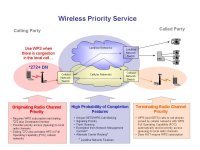National Communications Systems
Wireless Priority Service(WSP)
Wireless Priority Service (WPS) is a priority calling capability that greatly increases the probability of call completion when a National Security/Emergency Preparedness (NS/EP) user is unable to complete emergency calls while using their cellular phone. To make a WPS call the user must first have the WPS feature added to their cellular service, and dial *272 plus the destination telephone number.
WPS and its companion priority service, the Government Emergency Telecommunications Service (GETS), are requested through a secure on-line system. Before service can be requested, participating organizations must establish a Point of Contact (POC) account. The GETS/WPS POC serves as each organization's program administrator. Once an organization has an established POC, they can request GETS and WPS. The NCS recommends that each WPS user also have a GETS card.
WPS is an add-on feature subscribed on a per-cell phone basis that works with existing cell phones in WPS enabled cellular networks; no special phones are required. WPS provides priority for emergency calls through a combination of special cellular network features and the same "High Probability of Completion" features used by GETS:
- Originating Radio Channel Priority: WPS addresses congestion in the local radio access channel (or cell), which is often the reason that cellular calls cannot be made during heavy calling periods or when damage to network infrastructure occurs. WPS automatically provides priority access to local radio channels, placing WPS calls in queue for the next available channel if a channel is not immediately available. Originating Radio Channel Priority requires WPS feature activation on the calling cellular phone. WPS calls do not preempt calls in progress nor will WPS users monopolize all available cellular resources.
- High Probability of Completion Features: When a radio access channel becomes available and the call proceeds, WPS calls are assigned a unique "NS/EP" call marking by the cellular network switching equipment. This marking triggers industry standard High Probability of Completion (HPC) features residing in most U.S. telecommunications networks as calls are routed from the originating cell to the called cellular or landline phone. These HPC features significantly increase the probability of call completion should the call encounter network congestion or blockage beyond the originating cell. Thus, WPS calls receive similar "across the network" priority as GETS calls without having to dial the GETS access number and PIN.
- Terminating Radio Channel Priority: Incoming WPS (and GETS) calls to cell phones served by WPS enabled cellular networks automatically receive priority access to local radio channels, placing incoming GETS and WPS calls in queue for the next available channel if a channel is not immediately available. Terminating Radio Channel Priority does NOT require the called cellular phone to be subscribed to WPS. Incoming GETS and WPS calls do not preempt cellular calls in progress nor will they monopolize all available cellular resources.
|
NEWSLETTER
|
| Join the GlobalSecurity.org mailing list |
|
|
|


